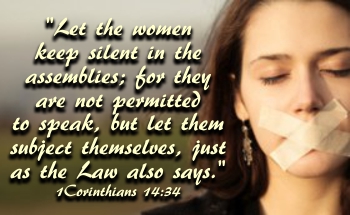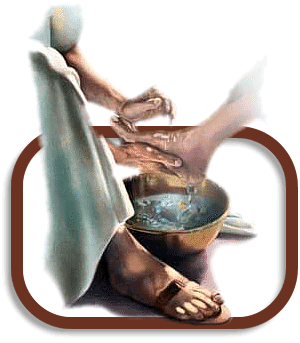
|
by haRold Smith
a citizen of the Commonwealth
(Ephesians 2:12)
A reader wrote: "We recently encountered a group in our area that we were excited to fellowship with who gathered on Shabbat for Torah readings/Bible study. The wife leads the study because the husband is out of town every two weeks. She seemed very knowledgeable and passionate for caring for the sheep. The other day my husband was sharing some concerns within the Hebrew Roots Movement such as people getting so Torah conscious and learning Paleo Hebrew etc. that they have stopped focusing on Yeshua Messiah. To get to the point she took it as a personal attack and wigged out on my husband. Like she said 'let's go toe to toe right now'. Anyway, neither of them at this point exhibited much spirit controlled demeanor but we actually worked through it and things settled down so we could get on with the Torah study. My actual question is: Is there scripture validation for women leading or not leading mixed groups of men and women? The husband of this group had a talk with my husband the other day and apparently his wife seems to have issues with men of strong or dominant personalities and has practically fist fought with men that she saw as a threat. There seems to be more dynamics going on than meets the eye. My husband seems to react strongly to any woman who acts in a leadership type role. At the meeting it was like two pit bulls collided with the same spirit. Can you shed any insight?"
All kinds of situations are asked by readers of these articles - women believing they should or shouldn't teach to men, men believing women shouldn't teach (except to other women), men and women who point fingers at one another, women who want to usurp, men who want to control, men who want to be usurped - it never ends. And everybody uses different scripture from the brit hadasha (NT) to support their point of view. I find it curious that when those scriptures were written, keeping slaves was a common practice spoken of in the Messianic times as well and, yet today, nobody uses those scriptures to condone slavery in these times. Now, having said all that, 1Corinthians 14:40 (click on highlighted words to view content) says there is an order to things, not for the purpose of suppressing or stifling individuality or gifting, but so that the Father can rise to a place of exaltation among us. We mostly see scripture through a prism of what we have been taught by or experienced at the hands of others, instead of doing the heavy work of looking for ourselves to see what these words actually mean.
For instance, 1Timothy 2:12 says, "But I suffer not a woman to teach, nor to usurp authority over the man, but to be in silence." This is the ONLY place in scripture this phrase is used. The word translated as the English "authority" here is not the same Greek word used in Luke 9:1 which is eksousia and means "power of choice". Here it is authenteo which means 1) one who with his own hands kills another or himself 2) one who acts on his own authority, autocratic 3) an absolute master 4) to govern, exercise dominion over one. To usurp authority means "to seize and take hold of". When anyone, male or female, becomes autocratic, it kills the Spirit of the Father - He doesn't exist in that environment because it is contrary to His Nature. Part of the definition of the Greek word translated as the English "teach" in this verse is didasko and means to "impart instruction, to instill doctrine into one". I see this saying that when a woman tries to be doctrinal, she places herself in a position of dominion over men and, because it is out of the order of YHVH's creation, it does not create a place that is inviting to the spirit of holiness - that there is a more excellent way. When we look at the actual meaning of the words and the context they are used in (the prior verse says women should learn [doctrine] in all submissiveness), I see a warning to avoid a woman lusting for power and autocracy. Well, heck, I am going to avoid a MAN doing that. The purpose of the establishment of the Kingdom was to have a culture of righteousness that would be observably set apart from the rest of the world - the definition of holiness. We have traditionally been taught to think of justice as a court of law, but the justice of the Kingdom has more in common with the Father's Nature of selfLESSness (to look upon the things of the brethren as more essential than my own) than with rules and regulations. To live in, to abide in this Kingdom requires an adherence to His code of conduct - His Constitution. Within the realm of this Kingdom is found that thread of selfLESSness running through each of His instructions (Micah 6:8).
Luke 2:36-38 speaks of Anna, a prophetess, and says, "And she coming in that instant gave thanks likewise unto YHVH, and spake of Him (Yeshua) to all them that looked for redemption in Jerusalem". It doesn't say she just spoke to the women because the passage says she was in the temple, where all the men were gathered also. She wasn't married, having been a widow for 44 years, so her only "covering" was YHVH. It is not recorded where anybody rebuked her for speaking up - and isn't it interesting that the Father used a woman to herald Him in? When I see this kind of disparity in scripture, what I try to find is - where is the Heart and Nature and Character of the Father exalted? For a man or a woman to interject themselves simply because they "have a gift" is not the heart of the Father because other scripture says the "spirit of the prophet is subject to the prophet" and in Amos 3:7 scripture says YHVH reveals His secrets first to "His Servants" - some of which just happen to be prophets. You see, the Character and Nature of the Father is first selfLESSness, from which His Spirit flows and the rest then exalt the Father. These are the attributes Yeshua, as our pattern to follow, exemplified. I have been in many gatherings where my spirit burned within me and I never gave the word because I intentionally subjected myself to those who proclaimed themselves to be "in authority" (usually never pausing long enough to allow the Spirit of YHVH room to breathe). The Father, as a perfect gentleman, never forces Himself upon us; neither should we on each other - be we male or female.

|
Finally, this very unusual command flies in the face of all that Paul says about equality under the Messiah. His watchword is "neither Jew nor Greek, male nor female." This theme is so strong in Pauline theology that one would have to conclude that Paul was schizophrenic to suggest that we are all equal, but women are a little less equal. There can be no doubt about the meaning of the Greek verb epitrepo translated as the English "permitted" which certainly means "to permit, allow or entrust." Furthermore, the negative here is ou, the strongest form of Greek negation. So, analysis of the language doesn't seem to help us resolve this apparent contradiction. Something else must be going on because Paul doesn't need to see the theological psychiatrist. Is this just a momentary lapse into hopeless contradiction? Is Paul really a disguised misogynist? The word "assemblies" here is also uncharacteristic of Paul. A proclamation to all the assemblies doesn't fit the way Paul writes to individual assembly issues. The command for silence just doesn't fit Paul's previous remarks. The appeal to Torah certainly isn't Pauline, since he would have known there are no such commands in Torah. It is more likely that this is an insertion into Paul's letter, placed there by those who wished to assert predominance and foster hierarchy within "the church". There are hints of this problem throughout the Corinthian letters; hints about men who were using the platform of the assembly for their own glory. This suggestion makes a lot of sense. The only problem is that it punches a big hole in the idea of the inspiration of "New Testament" scripture. It suggests that we don't have a true copy of Paul's original letter. What we have is an edited copy, one tailored to accomplish purposes that Paul would never have endorsed. So, now we have to make a decision. Are we going to push for unequal yoking within the assemblies based on a text which has a lot of internal suspicious loopholes, or are we going to look at the broader context of Paul's consistent theme of equality and put a big question mark over this verse? While we are at it, let's look at a couple of other suspicious verses that always seem to arise with discussions about women.
| "A woman shall not wear a man's garment nor shall a man put on a woman's cloak for whoever does these things is an abomination to YHVH." Deuteronomy 22:5 |
The Hebrew word translated into the English "garment" is keliy which actually lends its meaning more toward a "utensil, implement, apparatus, or vessel." To stretch this meaning to mean "pants" is a completely disingenuous handling of the word. And the Hebrew word translated into the English "cloak" is simlah meaning "wrapper, mantle, covering garment, a raiment", something worn over the head - not stretching to a form of "skirt". Since this is the only instance in scripture that addresses this situation, the question we must ask ourselves is WHY. We must think as the audience that heard this first. How many changes of clothes did they have? What did clothes symbolize in the community? What was the reason for making this decree? What would it mean to the people coming out of Egypt? In other words, did Egypt have clear distinctions between gender dress - or not? We must remember that with the Hebrews, a vast "mixed multitude" of people came up with them out of Egypt - bringing with them all sorts of strange behavior (Exodus 12:38). It is obvious that something was being addressed here - but, WHAT and WHY? Why is this single verse found only among passages before and after it about animals? And why is it not referenced anywhere else? We are simply not given enough information to answer these question even though Christian denominational dogma attempts to make it into a "law" in order to subjugate women under a man's agenda.
| "But I want you to understand that Yeshua is the head of every man and the man is the head of a woman and YHVH is the head of Yeshua ." 1 Corinthians 11:3 |

|
Some of the material in this article is excerpted from Skip Moen's daily exegesis of biblical texts. You may read his studies by going to www.skipmoen.com and searching for the verse reference.
| "if indeed you continue in the faith, grounded and steadfast, and are not moved away from the hope of the gospel which you heard...the mystery which has been hidden from ages and from generations, but now has been revealed to His saints. To them YHVH willed to make known what are the riches of the glory of this mystery among the Gentiles: which is Yeshua in you, the Hope of Glory." Colossians 1:23-27 |
Please feel free to email me at harold@hethathasanear.com. While not claiming to have all the answers, it would be an honor to partake with you of what the Spirit is uncovering.